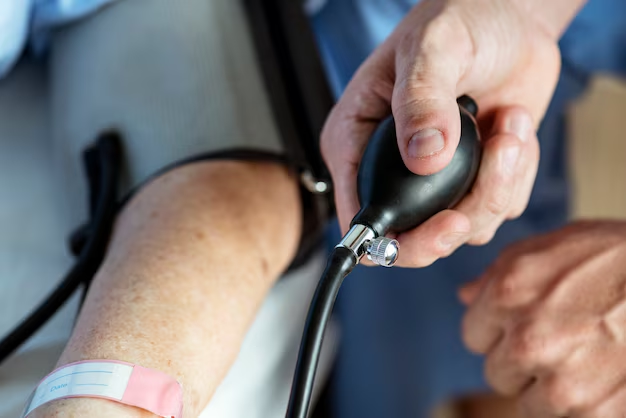Your Guide to What Is Essential Primary Hypertension
What You Get:
Free Guide
Free, helpful information about HyperTension FAQ and related What Is Essential Primary Hypertension topics.
Helpful Information
Get clear and easy-to-understand details about What Is Essential Primary Hypertension topics and resources.
Personalized Offers
Answer a few optional questions to receive offers or information related to HyperTension FAQ. The survey is optional and not required to access your free guide.
Understanding Essential Primary Hypertension: What You Need to Know
Do you ever wonder why the term “silent killer” often accompanies discussions about high blood pressure? It’s because hypertension, especially essential primary hypertension, is one of the most prevalent yet insidious health issues today. Often undiagnosed and untreated, it can lurk unnoticed while silently wreaking havoc on your body. But what exactly is essential primary hypertension, and why does it matter?
What Is Essential Primary Hypertension?
Essential, or primary, hypertension is the most common form of high blood pressure, affecting the vast majority of people with hypertension. Unlike secondary hypertension, which has a clearly identifiable cause such as kidney disease or hormone abnormalities, essential hypertension occurs with no identifiable medical condition as its cause. This lack of a clear source makes it more challenging to manage.
Primary hypertension develops gradually over many years. Various risk factors, including age, genetic predisposition, lifestyle choices, and diet, contribute to its onset. Over time, these factors can upset the delicate balance of circulatory systems, leading to persistently elevated blood pressure levels.
Why Is It Important to Address This Condition?
Living with unmanaged hypertension, even if symptom-free, significantly increases the risk of stroke, heart attack, heart failure, and kidney disease. That's why early detection and management are crucial. A diagnosis of essential hypertension isn't a life sentence; instead, it should be seen as a call to action—one that urges you to take proactive steps toward a healthier lifestyle.
Managing Essential Hypertension: Practical Steps
Regular Monitoring and Medical Consultation: Routine blood pressure checks help keep track of your levels. Work with your healthcare provider to create a personalized management plan.
Lifestyle Adjustments:
- Diet: Adopt a balanced diet rich in fruits, vegetables, whole grains, and lean proteins. The DASH (Dietary Approaches to Stop Hypertension) diet is particularly effective.
- Exercise: Regular physical activity can significantly lower blood pressure. Aim for at least 150 minutes of moderate-intensity exercise per week.
- Weight Loss: Maintain a healthy weight; even a small reduction can positively impact blood pressure levels.
Avoid Harmful Habits:
- Limit Alcohol and Tobacco: Reduce alcohol consumption and quit smoking to improve heart health dramatically.
- Manage Stress: Practice relaxation techniques like meditation, yoga, or deep breathing to manage everyday stress.
Exploring Financial and Educational Resources
Understanding your health conditions is vital, but managing the costs associated with care can be daunting. Fortunately, numerous government aid programs and financial assistance options exist to support individuals dealing with chronic conditions like hypertension.
In addition to health-focused strategies, financial stability and access to education can indirectly contribute to improved health outcomes. Whether it's about managing medical bills or pursuing further education, several resources can help you take control:
- 🔹 Federal Health Coverage Programs: Medicaid and Medicare can provide financial support for those who qualify, reducing the economic burden of medical care.
- 🔸 Debt Relief Options: Organizations offer counseling and assistance to help manage and pay down medical debt effectively.
- 🔹 Credit Card Solutions: Some credit plans cater specifically to medical expenses, with favorable terms for managing unexpected healthcare costs.
- 🔸 Educational Grants: Scholarships and grants are available for adult learners seeking to advance their education, leading to better job prospects and financial security.
By staying informed about these opportunities, you not only improve your financial landscape but also enable a healthier, stress-free environment, essential for managing hypertension.
The journey to effectively managing essential primary hypertension starts with empowerment. Equip yourself with the right knowledge and resources, and you can turn a potentially overwhelming diagnosis into a manageable part of a healthy, fulfilling life.
What You Get:
Free HyperTension FAQ Guide
Free, helpful information about What Is Essential Primary Hypertension and related resources.

Helpful Information
Get clear, easy-to-understand details about What Is Essential Primary Hypertension topics.

Optional Personalized Offers
Answer a few optional questions to see offers or information related to HyperTension FAQ. Participation is not required to get your free guide.


Discover More
- a 66 Year Old Female With a History Of Hypertension
- Are Eggs Bad For Hypertension
- Are Eggs Good For Hypertension
- Are Endocrine Disorders Causing Hypertension Rare
- Can Adderall Cause Hypertension
- Can Alcohol Cause Hypertension
- Can Allergies Cause Hypertension
- Can Anemci People Get Hypertension
- Can Anemia Cause Hypertension
- Can Antibiotics Cause Hypertension
